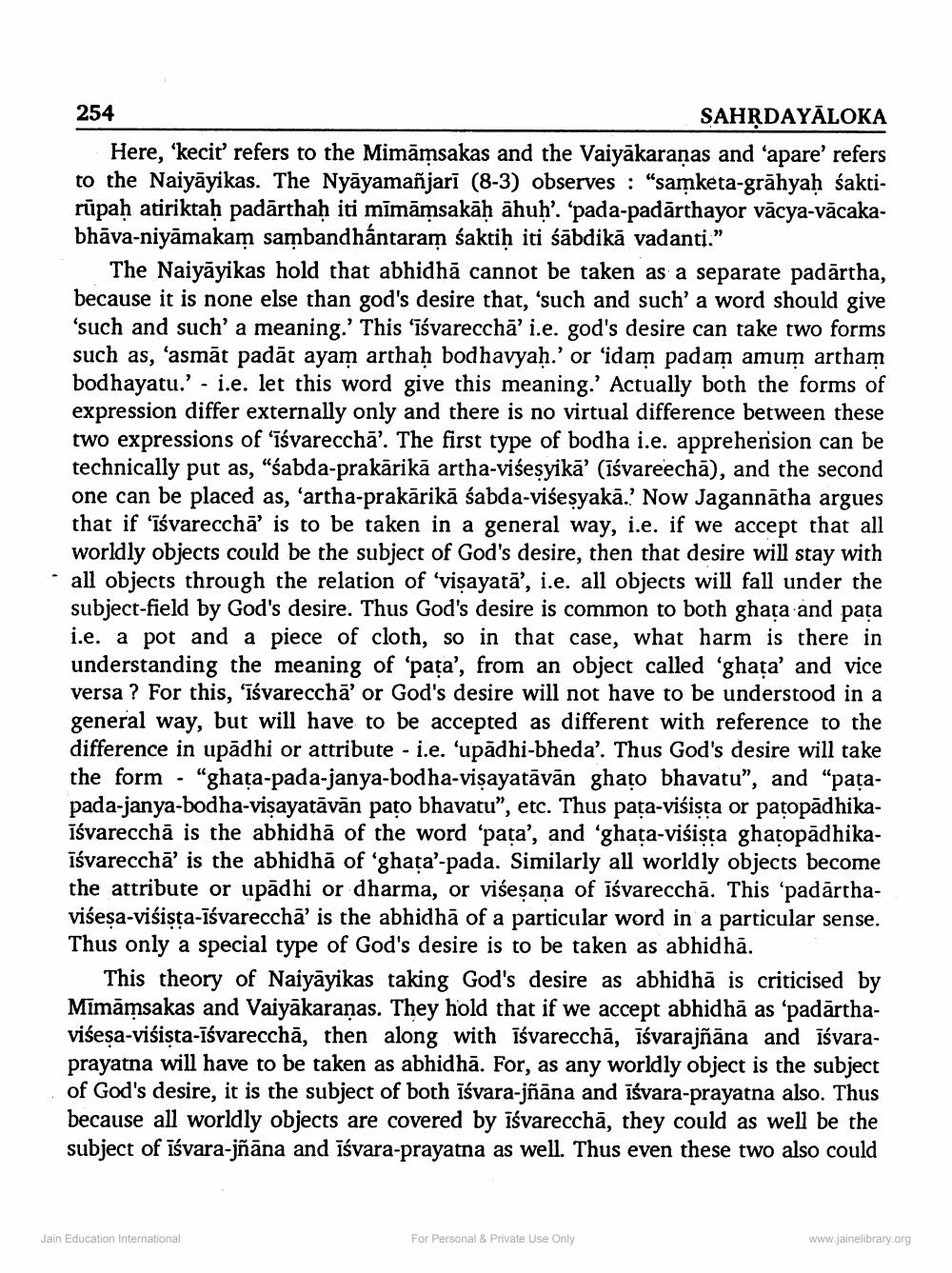________________
254
SAHRDAYĀLOKA Here, 'kecit' refers to the Mimāmsakas and the Vaiyākaranas and ‘apare' refers to the Naiyāyikas. The Nyāyamañjarī (8-3) observes : "samketa-grāhyaḥ śaktirūpaḥ atiriktah padārthaḥ iti mīmāmsakāḥ āhuh'. 'pada-padārthayor vācya-vācakabhāva-niyāmakam sambandhantaram saktiḥ iti śābdikā vadanti."
The Naiyāyikas hold that abhidhā cannot be taken as a separate padārtha, because it is none else than god's desire that, 'such and such a word should give 'such and such' a meaning.' This ‘īśvarecchā' i.e. god's desire can take two forms such as, 'asmāt padāt ayam arthah bodhavyah.' or 'idam padam amum artham bodhayatu.' - i.e. let this word give this meaning. Actually both the forms of expression differ externally only and there is no virtual difference between these two expressions of ‘īśvarecchā'. The first type of bodha i.e. apprehension can be technically put as, "sabda-prakārikā artha-viśesyikā' (iśvareechā), and the second one can be placed as, ‘artha-prakārikā sabda-viśesyakā. Now Jagannātha argues that if 'iśvarecchā' is to be taken in a general way, i.e. if we accept that all worldly objects could be the subject of God's desire, then that desire will stay with all objects through the relation of 'visayatā', i.e. all objects will fall under the subject-field by God's desire. Thus God's desire is common to both ghata and pata i.e. a pot and a piece of cloth, so in that case, what harm is there in understanding the meaning of 'pata', from an object called 'ghata' and vice versa ? For this, 'īśvarecchā' or God's desire will not have to be understood in a general way, but will have to be accepted as different with reference to the difference in upādhi or attribute - i.e. 'upādhi-bheda'. Thus God's desire will take the form - "ghata-pada-janya-bodha-visayatāvān ghato bhavatu”, and “pațapada-janya-bodha-visayatāvān pato bhavatu", etc. Thus pata-visista or patopādhikaīśvarecchā is the abhidhā of the word 'pata', and 'ghața-visista ghatopādhikaīśvarecchā' is the abhidhā of 'ghata'-pada. Similarly all worldly objects become the attribute or upādhi or dharma, or višeşana of iśvarecchā. This ‘padārthavisesa-visista-īśvarecchā' is the abhidhā of a particular word in a particular sense. Thus only a special type of God's desire is to be taken as abhidhā.
This theory of Naiyāyikas taking God's desire as abhidhā is criticised by Mimāmsakas and Vaiyākaranas. They hold that if we accept abhidhā as 'padārthavišesa-viśista-īśvarecchā, then along with iśvarecchā, īśvarajñāna and iśvaraprayatna will have to be taken as abhidhā. For, as any worldly object is the subject of God's desire, it is the subject of both īśvara-jñāna and īśvara-prayatna also. Thus because all worldly objects are covered by īśvarecchā, they could as well be the subject of īśvara-jñāna and īśvara-prayatna as well. Thus even these two also could
Jain Education International
For Personal & Private Use Only
www.jainelibrary.org




